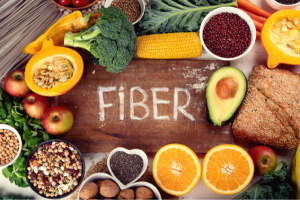How Dietary Fiber Reduces Your Risk of Gallstones

A new study has added to the increasing body of research about the importance of fiber and reducing the risk of gallstones.
Gallstones are hardened deposits of digestive fluid that can form in the gallbladder, a small organ located under the liver. While the exact cause of gallstones is unknown, certain factors can increase the risk of developing them, including a high-fat diet and being overweight. In this blog, we'll explore the relationship between fiber and gallstones and how you can incorporate more fiber into your diet.
What is Fiber?
Fiber is a type of carbohydrate found in plant-based foods such as fruits, vegetables, whole grains, nuts, and seeds. Unlike other carbohydrates, fiber cannot be digested by the body's enzymes, so it passes through the digestive system largely intact. There are two types of fiber: soluble and insoluble.
Soluble fiber dissolves in water to form a gel-like substance that can help lower cholesterol levels and regulate blood sugar. Sources of soluble fiber include oats, beans, apples, and citrus fruits.
Insoluble fiber does not dissolve in water and adds bulk to stool, helping to prevent constipation and promote regular bowel movements. Sources of insoluble fiber include whole grains, nuts, seeds, and vegetables.
How Fiber Can Help Prevent Gallstones
Fiber can play a role in preventing gallstones by:
- Reducing the amount of bile in the gallbladder: Bile is a digestive fluid produced by the liver and stored in the gallbladder. When bile contains too much cholesterol, it can crystallize and form gallstones. Soluble fiber can help bind to excess bile and remove it from the body, reducing the risk of gallstone formation.
- Regulating insulin levels: Insulin resistance, a condition in which the body becomes less responsive to the hormone insulin, can increase the risk of gallstones. Soluble fiber can help regulate blood sugar levels and improve insulin sensitivity, reducing the risk of insulin resistance and gallstones.
- Promoting weight loss: Being overweight or obese is a risk factor for gallstones. Fiber can help promote feelings of fullness and reduce calorie intake, leading to weight loss and a reduced risk of gallstones.
How to Incorporate More Fiber Into Your Diet
If you're looking to increase your fiber intake to reduce the risk of gallstones, here are some tips:
- Choose whole foods: Whole fruits, vegetables, whole grains, nuts, and seeds are all good sources of fiber.
- Aim for 25-30 grams of fiber per day: Most adults should aim for a minimum of 25-30 grams of fiber per day. Gradually increase your fiber intake to avoid digestive discomfort.
- Add fiber-rich foods to your meals: Include fiber-rich foods in your meals and snacks. For example, add berries to your breakfast cereal, snack on raw vegetables with hummus, or add beans to your soup or chili.
- Supplement: If you are still having a hard time getting enough fiber, Consider a supplement. ClearFiber mixes easily with any beverage and adds about 3 grams of extra fiber per serving.
Categories
Categories
Humanized Health - NEW!
Learn about personalized health from top experts! Check out our fascinating new shows every week, available as videos, podcasts and transcripts.:
Our Bloggers
-
 Paula Gallagher
Paula Gallagher
Paula is a highly qualified and experienced nutrition counselor on the staff at Village Green.
read more.. -
 Margo Gladding
Margo Gladding
Margo's impressive knowledge base is the result of a unique blend of educational and professional experience.
read more.. -
 Dr. Neal Barnard
Dr. Neal Barnard
Dr. Barnard leads programs advocating for preventive medicine, good nutrition, and higher ethical standards in research.
read more.. -
 Dr. Joseph Pizzorno
Dr. Joseph Pizzorno
Dr. Joseph Pizzorno, ND is a pioneer of integrative medicine and a leading authority on science-based natural medicine.
read more.. -
 Debi Silber
Debi Silber
Debi is a registered dietitian with a master’s degree in nutrition, a personal trainer, and whole health coach.
read more..
SEE ALL OF OUR BLOGGERS


Village Green Apothecary
5415 W Cedar Ln
Bethesda, Maryland, 20814
(301) 530-0800
Toll Free: (800) 869-9159
The information provided on this site is not intended to be a substitute for advice or treatment from a qualified physician, nor is it intended to diagnose or treat a health problem or disease. Consult your physician prior to starting any new health program or if you any questions regarding a medical condition.
© 2025 Village Green Apothecary - All Rights Reserved.



